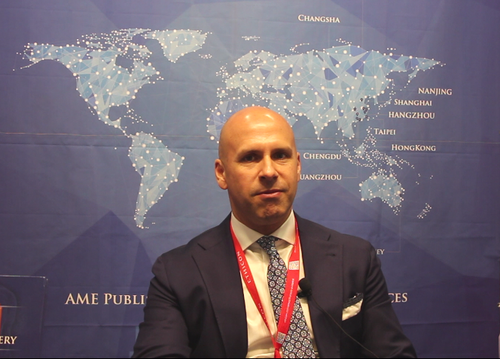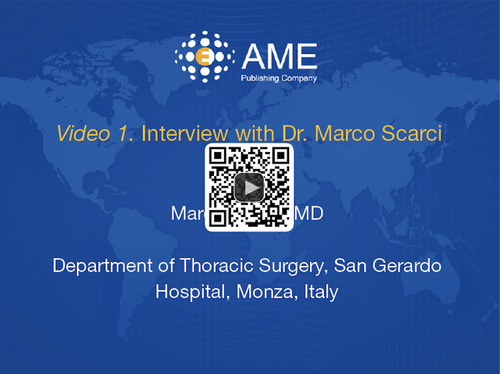Editor’s note
The 27th Annual Meeting of the European Society of Thoracic Surgeons (ESTS) was held on June 9–12, 2019 at the Convention Centre Dublin, in Dublin, Ireland. As the world's top event in the field of general thoracic surgery, the ESTS annual meeting brings together thousands of experts and scholars from around the world to discuss the hotspots of thoracic surgery, update research progress, and share their experiences. The AME editorial team was with great honor to invite Dr. Marco Scarci to conduct a brief interview during the meeting.

Figure 1 Dr. Marco Scarci.
Expert introduction
Dr. Marco Scarci (Figure 1) is the Director of the ESTS annual meeting. He works at the Department of Thoracic Surgery, San Gerardo Hospital, Monza, Italy.
Dr. Scarci undertook his specialist training in Italy, Essex Cardiothoracic Center and Guy’s and St Thomas. He spent 6 months between University of Toronto and McMaster University for a fellowship in minimally invasive surgery. Dr. Scarci’s practice is in pure thoracic surgery. He works closely with a large team including other surgeons, specialist nurses, radiologists and physicians and together they aim to provide the best outcome for patients.
Dr. Scarci’s areas of major interest are resection of locally advanced cancer, malignant mesothelioma, rehabilitation after thoracic surgery and clinical trials. He also has a keen interest in medical education and, after several courses, he is currently doing a Masters in medical education.
Dr. Scarci is actively involved with the European Society of Thoracic Surgeons where he leads the chest wall database, pleural malignancies and chest wall working groups. He is also member of the database committee and involved with NICE working groups.

Figure 2 Interview with Dr. Marco Scarci (1).Available online: https://www.asvide.com/article/view/32806
Interview (Figure 2)
CCTS: What impress you most in your experience as the Director of the ESTS annual meeting? What are the most exciting aspects?
Dr. Scarci: This is my second year as an organizer of the meeting, and what I really like is the complexity of the meeting and the different exceptional professors that come to our meeting. So we get lots of surgeons from different background, different countries, nurses, allied health professionals and we have so many different activities that go on at the same time that really makes this meeting exciting.
CCTS: What kinds of topics/researchers on the program of this year would you focus your attention on? Why?
Dr. Scarci: Well, I think there have been several things that we’ve done. The new training village is one thing, the video corner, and of course we have some special sessions on key papers through the year, which haven’t been done before. We wanted to offer something for every taste.
CCTS: With rich experience in thoracic surgeries, you must have encountered some really challenging cases. Would you please share an impressive/significant one with us? What was the lesson learned from it or what shoulda surgeon do for better decision if he/she has no absolute evidence?
Dr. Scarci: I think there are many experience, but one that struck me recently was that a really young patient who was around thirty had developed lung cancer, and this case was misdiagnosed by the family doctor. And this patient just had a young child. It is the importance non-neglecting patients’ symptoms for too long.
CCTS: You have worked in UK and Italy and visited to many other countries, what are the differences in terms of the working pressures for doctors?
Dr. Scarci: Well, I think most western countries share the same attitude towards doctors, of course there are certain countries just as UK and US that are well organized, while some other countries in Europe are less organized, but we should find a way to deliver a really good care to patients. I believe doctors do share more or less the same burden whatever they work.
CCTS: What are the major opportunities and challenges that the young generation of surgeons is faced with nowadays?
Dr. Scarci: I think the major challenge essentially is the training in the time when the patient and the operation become more complex, while the time for training become less and less, so of course I think the young surgeons should come to this meeting to make advantage of different opportunities that made available to them, just as I said in the training village and videos and the mentorship programs that spread all over the world. These are my biggest advice to the younger generations.
CCTS: What is the best way for people to learn and advance in a modern surgical career with booming knowledge and rapidly changing technologies? Should they highly focus on and specialize in an area or try to dabble in as extensive areas as they can?
Dr. Scarci: Well, it depends on what they are doing. At the beginning, they should have a broad foundation, but then they should specialize in a field and then become really good at that.
